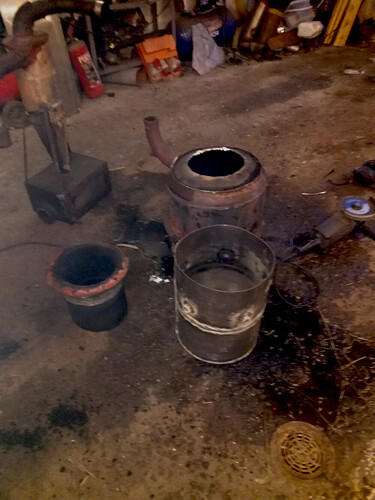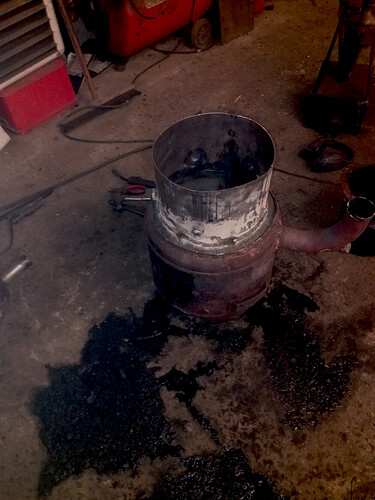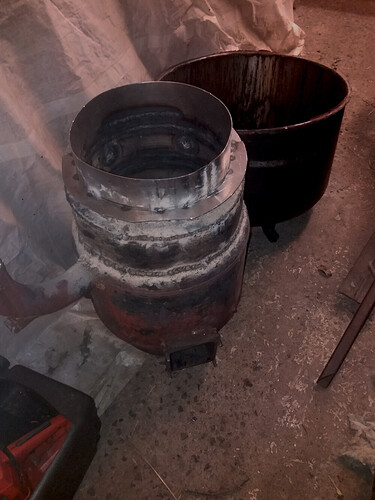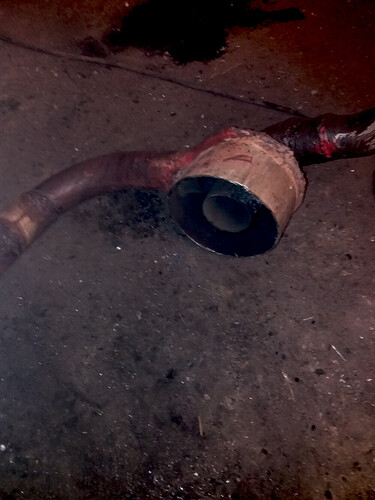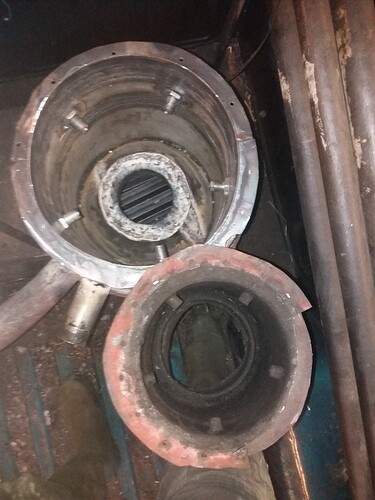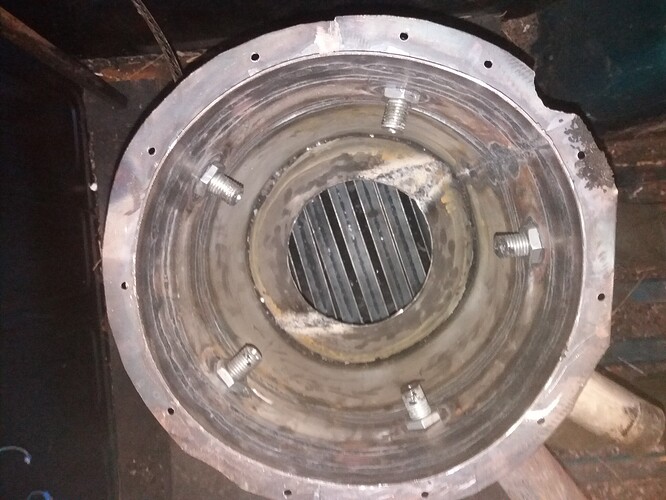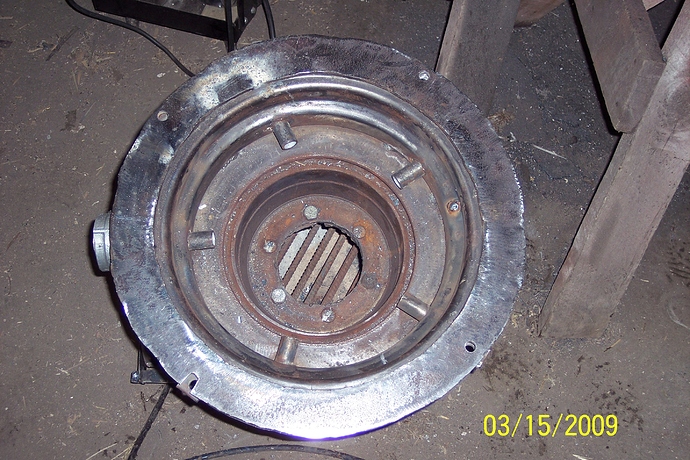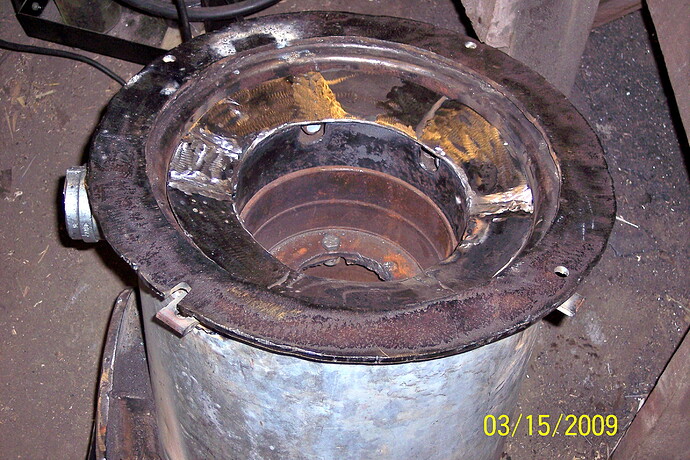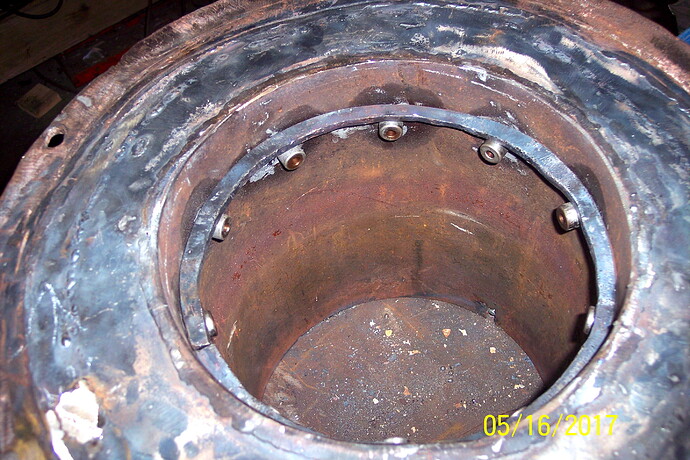Hi Jan, you can now build it with a sealing lid in case it happens again, or weld it up.
Bob
I have welded it together again, I have learned a lot from cutting apart and rebuilding the unit and peripherals
Some pictures of the conversion.
I extended the outgoing gas pipe inside the cyclone.
Larger fire pipes.
Only 10mm nozzles to begin with. (3/8 ")
110mm restriction, same as before. (4.3 ")
Nice Jan, that larger firetube is going to make a big difference in gas production.
Are the nozzles designed to be able to changed out?
Very nice fabrication work.
Bob
Thanks Bobmac.
I do not really like the flux thread, I am unsure all the time if it will be tight or not.
However, I lack the ability to make things nice.
Yes, the nozzles are screwed into nuts that are welded to the outside of the barrel, M20 (3/4 ")
Jan. Now that you have your nozzles (tyers) protruding out so far, I like to use a “tar fence”. It will stop the gases from going between the nozzles and miss going through the hot char.
I put the “tar fence” in with a conical plate on top to strengthen the “tar fence” and feed the wood chunks into the oxidation area better. But you can just make a ring slightly smaller than your nozzle tip circle, put holes at each nozzle, and then fill behind the fence with char/ash for insulation.
Even a simple ring like this will help. Make it a little larger to cover the entire nozzle.
TomC
Thanks for the advice Tom.
I was just sitting and thinking about you, I have had problems with mine that my wood does not collapse.
Have you had such problems?
Also thought about how big your wood container is?
How far can you drive on a load of firewood?
Also thought about making an extension for the hopper, would be pretty simple, how high above the ceiling do you have your hopper?
I was going to try a little different distances on the nozzle mouth and different sizes of the diameter of the nozzles, they can be screwed in and out.
Jan; I have to be honest with you, I haven’t had my truck running in some time. I kept experimenting until I had it really messed up. Last night I finally got my shop warm enough to start rebuilding. I’m going back to the original design, which was tire rims and disk brake rotors.
I only had hopper problems on short drives. Long drives made everything work better. My “wood container” is a 55 gal drum cut down so that it doesn’t stick up more than 6 or 7 inches above the cab. ( mine is a full size truck-- Silverado which makes it probably a little larger than yours would be if the distance above the cab is maintained.)
I don’t have a odometer on my truck, so I drive by my watch. One hour, and then I start looking for a place to pull off to refill. Probably 50 to 55 miles.
You can go about experimenting with nozzle circle, tyre orfice diameter, grate, reduction zone, and all those things, but I think I can safely say, you will never find a “big” improvement with any of that. I had to go to a completely different gasifier than the Imbert, before I found a significant improvement, and then I tarred up my engine.
Now I just want to go back to my original build, and enjoy driving on wood. TomC
What did you come up with now for heating your shop?
Don. I had that 60,000 BTU propane heater that I felt created too much moisture in the shop. I gave it a lot of thought. Couldn’t come up with a reasonable way of using wood, so I bit the bullet and put in a 5-7,000 BTU “electric modine” . I justified the electric in that I only use it for a hour or two some times— not a steady heater. Last night -10 f I turned on the electric for the first time and it didn’t get the job done. So, I cranked up the propane, just for a short time to get the heat up, then went with the electric until it started cooling off. It helped that I was cutting steel with a oxy/adt torch. TomC
I am very happy with how the car is going today, but I am a little worried about tar.
So I’m still a little careful .
The car is much stronger than before, and I get to have 3 times as much air on now.
Tried a little bit today on an uphill slope and it then does 100kmh (60mph) pretty easy, also sees that where the car used to go at 60kmh (37mph) (upphill) it goes easily at 80kmh (50mph) 
Jan, it seems your new gasifier is a winner👍
Jan, That sounds like what I would expect out of an S10 with the 4.3l. That is why I have been looking for one for the last several years. Unfortunately the longer I look, the older they get, and the more rusted out they are. TomC
JO, a winner, I do not know yet how it will work when I idle longer distances, but otherwise I think it will work.
But now it’s built to Imbert’s measurements, so I’m not so surprised by this.
How often did you clean the radiators, so now when the cyclone was tight, the first radiator stopped.
Tom, is there a big difference between the S10 and Silverado?
Do you not think yours would work better if you went up to the size Imbert has in the spec?
I made my fire pipe in 2mm sheet metal (5 / 64in), so I do not know how long it lasts, but I lift the whole unit and the cyclone on the platform myself, so the weight is probably no more than 30-40 kg (66-88lb) ,
In hot summertime I may flush rails and rear tank once a week to keep a good cooling ability. Right now, it’s been so cold for so long, I haven’t flushed them for at least a month. Ice will accumulate faster than the soot gets washed out ![]()
Since I’m running the opposite direction, any debrie bypassing the cyclone gets caught in rear tank. I’ve never had coarse enough soot climbing up the rails to plug the 3/8" hayfilter drain valve.
Looked at the intake, does not look good, think it forms tar.
Where should I start, have not insulated the unit, have 11cm (4, 21/64 “) restriction, have 5 x 10 (0.39”) mm nozzles, have small pieces of wood about 1 / “2x 2” x 1/2 " , has between 10 and 15 (14-7f) degrees C cold.
Thought to start with 10cm (4")restriction?
NOOO! 11 or 10 cm won’t make much difference. Leave it alone!!! Don’t desturb the charbed!!!
The gasifier internals have just started to heal up, filling voids and surfaces with ash and soot - insulating itself from the inside. A good, well insulated (with ash and soot) charbed, is the most important factor.
Do whatever you can from the outside to help keep temps up.
I feel like I’m repeting myself, but I’m getting old enough not to care - so here we go ![]()
- As long as the gasifier is not broken in - use only really dry wood. Let the chunks sit next to your boiler for at least a week.
- Don’t make the chunks too small. That will cool the reaction.
- Insulate at least the hottest part of the gasifier.
- Avoid idling until the gasifier is warmed up.
- Run as rich as possible until it is warmed up or until you can start accelerating.
Amen on what JO sayd. Keep it perfect for a few 100 km to get it broken in. Then you can afford throwing all sort of junk in 
But, but, will you come and remove the tar from my engine then? 
